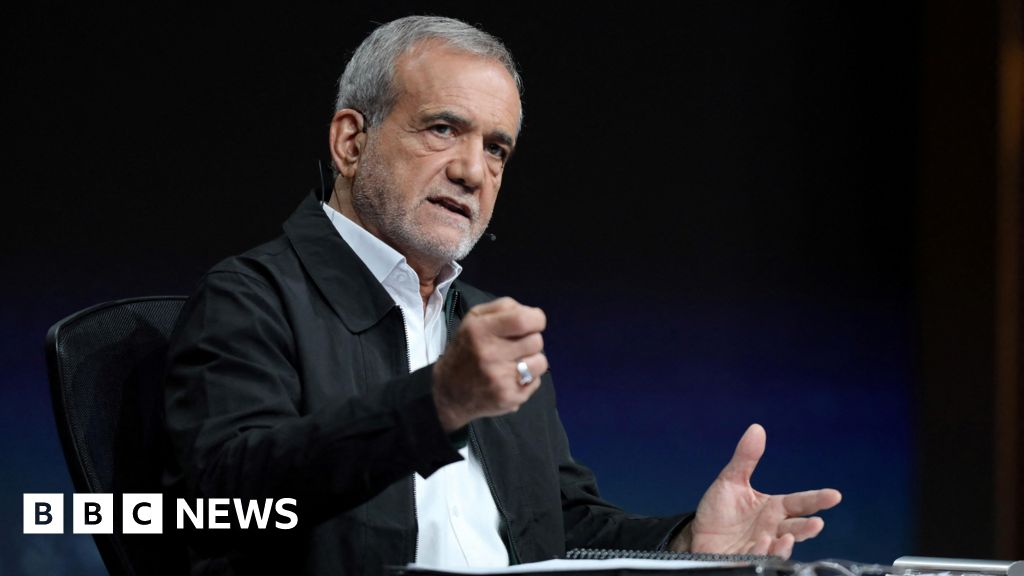World
Masoud Pezeshkian: The reformist now Iran’s president-elect – BBC News

- Author, Tom Bennett & BBC Persian
- Role, BBC News
Wildcard candidate Masoud Pezeshkian will become Iran’s first reformist president in almost two decades, after he defeated hardliner Saeed Jalili in a run-off election on Friday.
The 69-year-old former heart surgeon and health minister campaigned on promises to moderate Iran’s conservative outlook and improve relations with the West. He criticised the country’s notorious morality police and called for negotiations over a renewal of the faltering 2015 nuclear deal.
But analysts remain sceptical about his ability to enact meaningful change within an establishment dominated by ultraconservatives.
When Mr Pezeshkian’s name was confirmed on the ballot four weeks ago, following the death of hard-line President Ebrahim Raisi in a helicopter crash, even his most loyal supporters were shocked that he had made it past the Guardian Council.
The powerful body of clerics and jurists which vets candidates’ religious and revolutionary credentials had barred many prominent reformists and moderates from standing in recent elections, including Mr Pezeshkian himself for the last presidential poll in 2021.
But once his candidacy was approved this time, Mr Pezeshkian carefully balanced promises of change with declarations of loyalty to Iran’s Supreme Leader, Ayatollah Ali Khamenei, who holds ultimate authority in the country.
In a celebratory speech, he praised the “guidance” of Ayatollah Khamenei, saying he would not have been able to succeed without him.
With Iran facing a struggling economy, a shadow-war with Israel that burst into the open earlier this year, and continuing discontent over the violent crackdown on the women-led protests that erupted in 2022, the fact that Mr Pezeshkian was even allowed to stand could be a sign that the Supreme Leader wishes to soften the government’s stance on certain issues.
Masoud Pezeshkian was born in 1954 in the city of Mahabad, in the north-western province of West Azerbaijan.
He is of mixed Azeri-Kurdish ancestry and grew up speaking both languages, giving him broad appeal among the ethnic minority groups which make up more than a third of Iran’s population of 89 million.
He studied medicine in the years before the 1979 Islamic revolution – and as a fresh-faced doctor he organised medical assistance for wounded soldiers during the Iran-Iraq War in the 1980s. He specialized in cardiac surgery after the conflict.
In 1994, Mr Pezeshkian faced personal tragedy when his wife and son were killed in a car crash. He chose not to remarry, raising his daughter and two remaining sons alone – a story he told along the campaign trail, promising supporters: “As I was loyal to my family, I will be loyal to you.”
He rose up the political ranks in the early 2000s, serving as health minister during the second term of reformist President Mohammad Khatami’s government between 2001 and 2005.
He has represented the north-western city of Tabriz in parliament since 2008 and was a deputy speaker from 2016 to 2020.
After a crackdown on the unrest that followed the disputed 2009 presidential election, Mr Pezeshkian drew attention for his criticism of the government’s treatment of protesters, which spurred a backlash from Iran’s hard-line politicians.
Balancing change with loyalty
Mr Pezeshkian’s candidacy in this year’s presidential election was backed by major reformist groups and endorsed by Mr Khatami, as well as the moderate former president Hassan Rouhani.
He finished narrowly ahead of Saeed Jalili in the election’s first round, for which turnout was a record low of 40% amid calls for a boycott from opponents of the clerical establishment.
Turnout was almost 10 percentage points higher for the run-off, in which Mr Pezeshkian received 53.7% of the votes cast.
In a post on X following his victory, Mr Pezeshkian told Iranians that it marked the beginning of a “partnership”.
“The difficult path ahead cannot be smoothed without your co-operation, sympathy and trust. I extend my hand to you and swear by my honour I will not leave you alone in this course. Do not leave me alone,” he wrote.
Although Mr Pezeshkian is considered to be a reformist, he often emphasises his devotion to the Supreme Leader.
He has described himself as a “reformist principlist” and said: “I am a principlist, and it is for these principles that we seek reform.”
In the context of Iranian politics, “principlist” refers to conservative supporters of the Supreme Leader who advocate for protecting the ideological principles of the 1979 revolution’s early days.
Observers believe that it will be Mr Pezeshkian’s ability to straddle reformist and principlist agendas that will be crucial to his success.







:max_bytes(150000):strip_icc()/roundup-writereditor-loved-deals-tout-f5de51f85de145b2b1eb99cdb7b6cb84.jpg)


